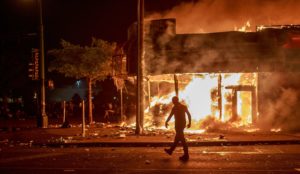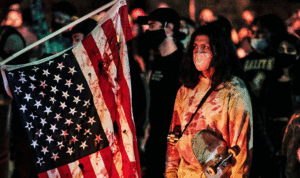“I’m asking myself, ‘What the hell is going on?’” said Gavin Newsom to the assembled cameras, “It looked like a third-world country.” California’s progressive governor was in his state’s largest city because of a piece of viral content: images of railway tracks in East Los Angeles strewn with thousands of emptied Amazon packages.
It’s easy to see why the images of the debris, a very pandemic-era combination of online shopping and urban lawlessness, received heavy play on local news and spread far and wide across the web. So bad was the litter problem — caused by systematic robbery, with criminal groups pilfering packages, ripping them open and running off with the most valuable goods — that a cargo train had derailed just a few days before Newsom’s late-January visit. And so here was the state governor, in jeans and a t-shirt (and a cloth mask outdoors) in a litter-picking photo-op: an irresistible visual to add to the thick dossier on Democratic misrule in California.
But the bluntness of Newsom’s reaction — as well as comparing his own state to a third-world country, he explicitly blamed organised criminals — was a revealing sign of this safely Democratic state’s changed political landscape.
Put simply, such statements might have been a political headache for a California Democrat only 18 months earlier. With the country in the throes of its post-George Floyd “reckoning” — dominated by a mood of hypersensitivity around anything relating to crime, policing, race and any combination of the three — references to the third world, as well as daring to be seen to be tough on crime, might not have gone down well. But Newsom received only fringe pushback.
In California’s two biggest cities, the signs of progressive retreat are everywhere. The extent of that retreat, and the question of exactly what comes after years of Leftwards shift, will define the political future of America’s most populous state.
In the past two years, London Breed, the Mayor of San Francisco, has performed a dramatic about-turn on crime and policing. In 2020, the city chief cut $120 million from the budget of the San Francisco police department. Yet a year later, she asked for emergency extra funding for the police and announced a crackdown on crime in the Tenderloin, the city’s most lawless neighborhood which operates as an open-air drug market. It was time, said Breed, to end the “bullshit”. Now she is doing battle with the city’s progressive forces to deliver on what, anywhere other than San Francisco, would be considered a reasonably common-sense clampdown given the scale of the city’s drug overdose and crime problems.
And she is far from alone. The campaign to recall Chesa Boudin, the city’s progressive prosecutor whose short time in office has been a disaster, was started by a group of local activists and quickly developed serious momentum. Campaigners secured enough signatures to force a citywide vote, which is scheduled for June, and look increasingly likely to triumph. A mid-February survey found that 68% of San Francisco voters planned to vote Boudin out of office. (That in a city where just 6.7% are registered Republicans.)
Campaigners in another recall push in the city found success last month when voters ousted three members of San Francisco’s school board. 70% of voters opted to ditch officials who seemed more interested in what to rename the city’s schools than figuring out how to reopen safely during the pandemic. (Among the names they hoped to erase from the San Francisco schools: George Washington, sitting Democratic Senator Dianne Feinstein and author Robert Louis Stevenson.) As part of her tack towards the center, Breed has supported the recall campaign.
A few hundred miles to the south, a group of Angelenos have taken inspiration from the anti-Boudin campaign and hope to oust LA’s head prosecutor. The move to recall George Gascón is in its early stages, with campaigners recently given the all-clear to start collecting signatures. But things don’t look good for Gascón, who is cut from a similar, hyperprogessive cloth to Boudin. Like Boudin, he has overseen a lethal slide towards lawlessness. And, like Boudin, he faces a furious internal revolt from his prosecutors. In a recently published internal survey by Los Angeles Association for Deputy District Attorneys, nine in ten prosecutors supported the recall effort. “Over a year ago, Gascón began a massive social experiment by redirecting prosecutorial resources away from enforcing the law while simultaneously ignoring large portions of the legal code,” said its vice-president Eric Siddall. “The result is an emboldened criminal element that knows the DA will not hold criminals accountable. This experiment needs to end.”
Even before a single vote has been counted, the anti-Gascón campaign has already changed policy in the city. In an effort to fend off the backlash, he has reversed two of his landmark policies: a ban on trying juveniles as adults and on seeking life without parole.
Meanwhile, in the crowded race to replace Eric Garcetti as the mayor of Los Angeles — Joe Biden has appointed him as the US ambassador to India — the mood is unmistakably moderate. Homelessness, crime and the cost of living dominate the debate. Karen Bass, a former congresswoman and the pick of the city’s Democratic machine, has swerved Rightwards, with a policy platform that features clearing homeless encampments as a prominent promise. This has dismayed the city’s progressives, who complain that she is “pandering to affluent Westside and Valley voters at the expense of black, Latinx and working-class ones”, as two Black Lives Matter activists put it in a recent column. (Needless to say, LA’s working-class voters, whatever their race, are by no means as on board with a far-Left approach to criminal justice as the authors claim.)
Meanwhile, Rick Caruso, a billionaire former Republican, has thrown his hat into the ring. Caruso, a shopping mall developer, is a big beast in LA civic life: he is a trustee at the University of Southern California and has been a member of the city’s Police Commission. In a statement confirming his switch from Independent to Democrat, he said that he “won’t be a typical Democrat… I’ll be a pro-centrist, pro-jobs, pro-public safety Democrat.” Caruso has backed the Gascón recall campaign. (Bass has not.)
The counterrevolution in California’s cities may seem fairly mild by national standards: a shift in tone among the same class of Democratic politicians. But the backlash on America’s left coast demonstrates the outer limits of tolerance for radical progressivism in American politics. As the novelist Wallace Stegner noted, California is like “America, only more so”.
When it comes to experiments in far-Left urban politics in recent years, that has undoubtedly been the case. Now the question is whether Californian Democrats have learned anything but the most shallow lessons from the last few years. It is one thing to acknowledge that “Defund the Police” is political kryptonite and nudge public safety spending back up. It is another to face up to the grave problems facing your city.
Voters are watching closely as the likes of Breed, or whoever is chosen to replace Garcetti, try to clean things up. A nod to the centre might be enough to spare short-term political disaster. But it will likely take more than that to actually solve the problems that have voters so frustrated.
Disclaimer
Some of the posts we share are controversial and we do not necessarily agree with them in the whole extend. Sometimes we agree with the content or part of it but we do not agree with the narration or language. Nevertheless we find them somehow interesting, valuable and/or informative or we share them, because we strongly believe in freedom of speech, free press and journalism. We strongly encourage you to have a critical approach to all the content, do your own research and analysis to build your own opinion.
We would be glad to have your feedback.
Source: UnHerd Read the original article here: https://unherd.com



